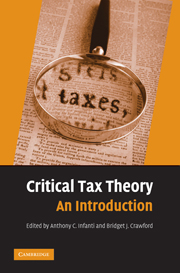Book contents
- Frontmatter
- Contents
- List of Illustrations
- List of Tables
- List of Contributors
- List of Common Abbreviations
- Introduction
- CHAPTER 1 FOUNDATIONS OF CRITICAL TAX THEORY
- CHAPTER 2 HISTORICAL PERSPECTIVES ON TAXATION
- CHAPTER 3 THE GOALS OF TAX POLICY
- CHAPTER 4 CRITICAL TAX THEORY MEETS PRACTICE
- A Legislator Named Sue: Re-Imagining the Income Tax
- Using the Social Background Model to Explain Who Wins Federal Appellate Tax Decisions: Do Less Traditional Judges Favor the Taxpayer?
- Tax Protest, “A Homosexual,” and Frivolity: A Deconstructionist Meditation
- Sisters in Law: Gender and the Interpretation of Tax Statutes
- Deconstructing the Duty to the Tax System: Unfettering Zealous Advocacy on Behalf of Lesbian and Gay Taxpayers
- CHAPTER 5 RACE AND TAXATION
- CHAPTER 6 GENDER AND TAXATION
- CHAPTER 7 SEXUAL ORIENTATION AND TAXATION
- CHAPTER 8 THE FAMILY AND TAXATION
- CHAPTER 9 CLASS AND TAXATION
- CHAPTER 10 DISABILITY AND TAXATION
- CHAPTER 11 GLOBAL CRITICAL PERSPECTIVES ON TAXATION
- CHAPTER 12 CRITICAL PERSPECTIVES ON CRITICAL TAX THEORY
- Index
Tax Protest, “A Homosexual,” and Frivolity: A Deconstructionist Meditation
Published online by Cambridge University Press: 04 August 2010
- Frontmatter
- Contents
- List of Illustrations
- List of Tables
- List of Contributors
- List of Common Abbreviations
- Introduction
- CHAPTER 1 FOUNDATIONS OF CRITICAL TAX THEORY
- CHAPTER 2 HISTORICAL PERSPECTIVES ON TAXATION
- CHAPTER 3 THE GOALS OF TAX POLICY
- CHAPTER 4 CRITICAL TAX THEORY MEETS PRACTICE
- A Legislator Named Sue: Re-Imagining the Income Tax
- Using the Social Background Model to Explain Who Wins Federal Appellate Tax Decisions: Do Less Traditional Judges Favor the Taxpayer?
- Tax Protest, “A Homosexual,” and Frivolity: A Deconstructionist Meditation
- Sisters in Law: Gender and the Interpretation of Tax Statutes
- Deconstructing the Duty to the Tax System: Unfettering Zealous Advocacy on Behalf of Lesbian and Gay Taxpayers
- CHAPTER 5 RACE AND TAXATION
- CHAPTER 6 GENDER AND TAXATION
- CHAPTER 7 SEXUAL ORIENTATION AND TAXATION
- CHAPTER 8 THE FAMILY AND TAXATION
- CHAPTER 9 CLASS AND TAXATION
- CHAPTER 10 DISABILITY AND TAXATION
- CHAPTER 11 GLOBAL CRITICAL PERSPECTIVES ON TAXATION
- CHAPTER 12 CRITICAL PERSPECTIVES ON CRITICAL TAX THEORY
- Index
Summary
TAX PROTEST
The words “tax protester” conjure the image of a crackpot, deadbeat, or charlatan. So tainted is the label that Congress has prohibited the IRS from referring to anyone as an “illegal tax protester” or “any similar designation.” As explained by the Treasury Inspector General for Tax Administration, who is charged with monitoring compliance with this prohibition, “the Congress had concerns that some taxpayers were being permanently labeled and stigmatized by the [illegal tax protester] designation.”
That a stigma is attached to the “tax protester” label may seem odd, given that tax revolts and rebellions have played an important role in the history of the United States. The Boston Tea Party, Shays' Rebellion, the Whiskey Rebellion, and Fries' Rebellion were all tax protests. Indeed, the Boston Tea Party and its protest of “taxation without representation” have become iconic symbols in the United States. Yet, despite the storied role of tax rebellion in U.S. history, it seems that the phrase “tax protester” has come to be associated with an assortment of crackpots, deadbeats, and charlatans who wish to tap into this nostalgia in order to legitimize (i) their assault on government and its ability to impose taxes, (ii) their desire simply to avoid parting with their money, or (iii) their exploitation of individuals who fall into one or both of the latter two groups.
However, not all tax protesters can be characterized as crackpots, deadbeats, or charlatans. There are others who do not readily come to mind when you hear or read the words “tax protester,” but who clearly fall within the ambit of that term.
- Type
- Chapter
- Information
- Critical Tax TheoryAn Introduction, pp. 88 - 94Publisher: Cambridge University PressPrint publication year: 2009



